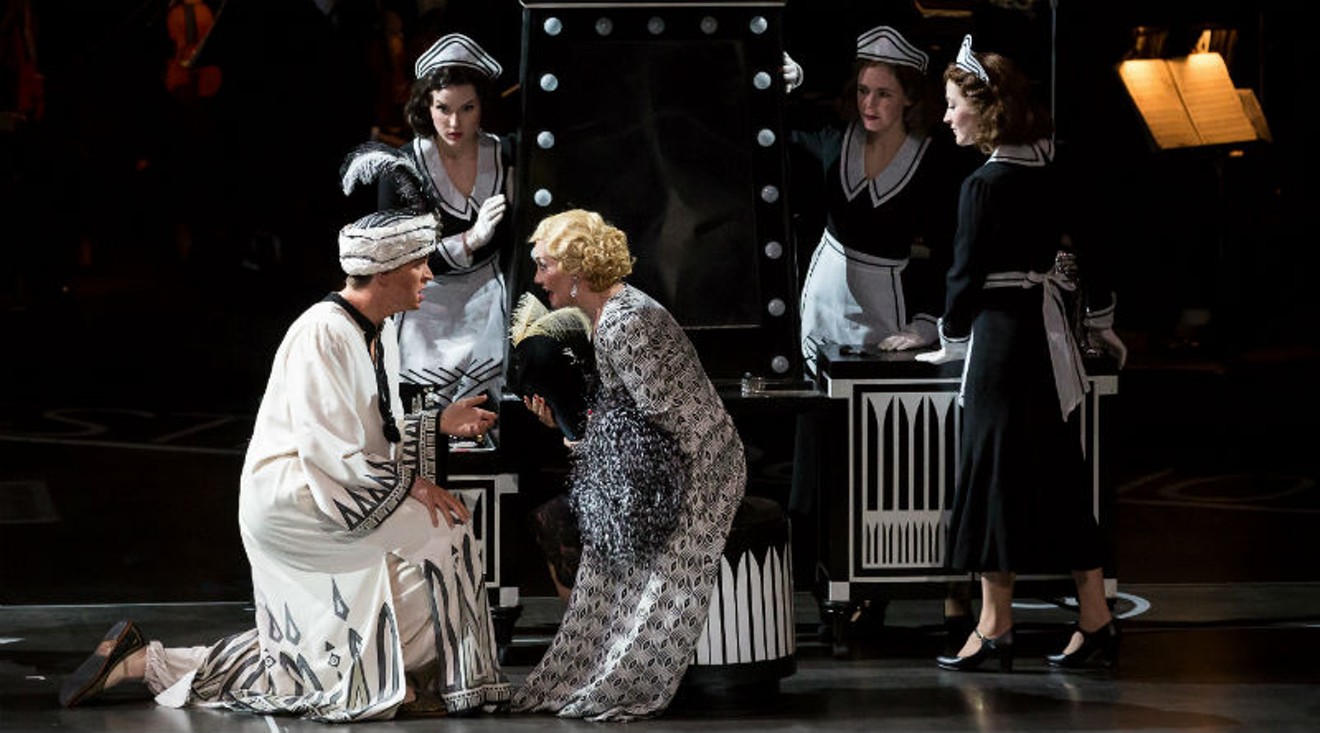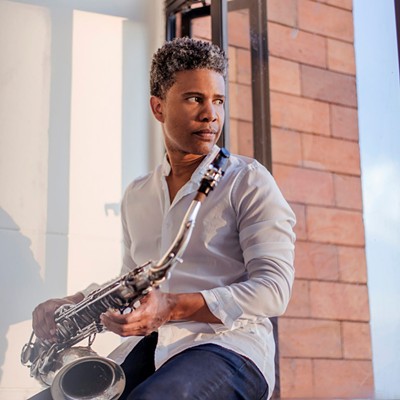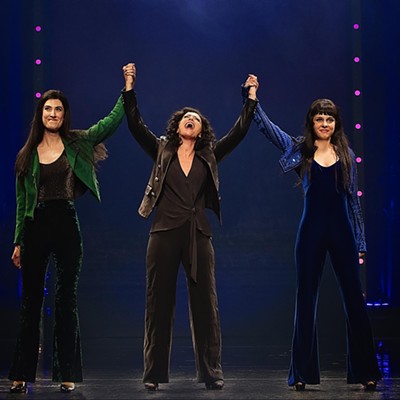
Aryeh Nussbaum Cohen as Nirenus, with Heidi Stober, as Cleopatra, and HGO supernumeraries in Julius Caesar.
Photo by Lynn Lane
After the wild pitch wrought by Hurricane Harvey, the Wortham Theater Center, home base to the Houston Grand Opera and Houston Ballet, has been knocked out of commission until next spring at the earliest even by the most optimistic accounts. Scrambling to continue a season has been nerve-wracking, if not hair-pulling.
Houston Ballet's epic-sized new Nutcracker, which premiered last season, will play this holiday season in a somewhat truncated form at Sugar Land's state-of-the-art Smart Financial Centre, increasing the outside-the-Loop audience to the joys of dance.
Having to find a venue for grand opera has been a task worthy of Hercules, but HGO's temporary home, hewn out of the third-floor, cavernous exhibition space at the George R. Brown Convention Center, now aptly christened the Resilience Theater, is nothing short of miraculous.
HGO opened its refurbished season with a squeeze-play production of Verdi's magnificent La Traviata: a lot of errors and no hits. But this one, George Frideric Handel's masterpiece Julius Caesar (1724), is a definite home run! HGO knocks this one out of the park with effortless control, muscular heft, musical assurance, and a big, ironic wink.
Set in '30s Hollywood, director James Robinson's vision is marvelous operatic trompe-l'oeil.
Baroque opera, especially its opera seria side, is one of musical theater's most stringent and somewhat alien art forms, often a tough slough for the uninitiated. For an audience accustomed to the immediate, heavy-heaving passions of Wagner, Verdi and Puccini, the rigid musical strictures from centuries past can be daunting, if not off-putting.
Blame this on the da capo aria. This is baroque opera's most obvious identifier. Basically written in a three-part structure – A, B, A – the aria is either fast, slow, fast; or slow, fast, slow. When the last part repeats (“da capo” means “from the head” or “from the beginning”), it's always more elaborate, filled with trills, ornamentation and breathless vocal tricks. But it can also be stultifying. Duets are rare, and when a character sings an aria, he/she rushes off the stage to be followed by the next character who rushes in to sing his/her A-B-A solo. A baroque opera often seems like an endless loop of greatest hits. But when penned by genius Handel – who could write exquisite melodies in his sleep – who wouldn't want to hear such a string of gems? My advice: Just go with the flow. Don't expect realism. These are allegories – in song. And there hasn't been anyone like Handel who can express a character's emotion in music with such simplicity, focus or rhythm.
Everything's upper case with these archetypal characters: Revenge, Remorse, Wrath, Love at First Sight, Libido, Lamentation, Joy. And they're all there in Handel's music.
This is another example of opera's eternal, mystifying pleasure. Baroque opera is internal. Later, Gluck, Mozart and Rossini would expand the stage, allowing singers to interact and make drama out of group conflict. Handel is content to make drama out of individuals.
In the mid-1700s, these works were all the rage. London couldn't get enough of Italian musicals. Handel, a recent import from Germany, supplied the English stage with dozens of operas that read like a who's who from Bulfinch's Mythology: Almira, Daphne, Nero, Agrippina, Tamerlano, Atalanta, Berenice, Xerses, all with Italian librettos, which no patron at the Royal Academy of Music – the opera theater created by Handel for Handel – could possibly understand.
But what everyone could understand, and still does to this day, is the exceptionally expressive music, sung by exceptionally expressive musicians.
The 1700s was a phenomenal era of superstar singers – male and female – and the audience demanded pyrotechnics. Damn the dramatic integrity, they wanted to be wowed, especially by the castrati, those male singers who had been surgically altered as youths to preserve their ethereal vocal quality. Farinelli, Caffarelli and Senesino (Handel's favorite, who originated the title role of Caesar) were the international rock stars of Europe – feted, lauded and pursued by rich patrons, male and female alike. Fortunately, this grotesque medical practice went out of fashion. Unfortunately, so too did the Baroque operas that apotheosized them. The great Handel works went into a slumber for centuries.
With the 20th-century ascendance of “countertenors” such as Alfred Deller, Iestyn Davies, David Daniels, David Hansen and Philippe Jaroussky, baroque opera has revivified, much like the 19th-century bel canto period of Bellini and Donizetti after the rise of Callas, Sutherland and Sills. A forgotten part of opera history has justifiably been restored and resurrected.
Julius Caesar is the apogee of baroque opera. Stunningly beautiful, this opera spins melody with effortless ease. Nothing gets by Handel. He depicts a character's fragile emotional state just as easily as he does a war scene. Horns call out during Caesar's “hunting aria”; the plaintive bassoon is prominent in Cleopatra's “lament”; the basso continuo of the theorbo, a lute on steroids, is plucked throughout, adding notes of mystery and depth to the story; and the harp (rarely used in the orchestra until Handel) adds otherworldly dimension to the royal seduction scene.
But what would baroque opera be without the “castrati” and their gender-bending voices? HGO gives us three “countertenors”: international superstar Anthony Roth Costanzo (Caesar); David Daniels, one of opera's veterans, the best anywhere (Ptolemy); and newbie Aryeh Nussbaum Cohen (Nirenus). Naturally, they are not castrati in the strict sense.
If you've ever rubbed a wet finger around the rim of an expensive wine glass, you know the aural quality of a fine countertenor: ethereal, hypnotic, ambiguous. The voice, un-gendered as it were, sounds like music from a moon of Saturn – clean, bright, unsexed. All of these accomplished artists have that sound. Agile and athletic, Costanzo fills the Resilience Theater with a commanding Caesar, able to blaze through Handel's fiendish coloratura with breath to spare, then quieting the house with subdued ardor when wooing his Cleopatra. He has a most beguiling physicality when he sings, for his body twitches, from shoulders through torso, when he maneuvers through Handel's vocal filigree, as if he's making the aural visible. Daniels, of course, is one of the world's leading countertenors, one of the first artists to put baroque opera on the contemporary map. He played Caesar in HGO's 2003 production. He still has the magic, even if he's lost a bit of his former oomph. His stage presence is unassailable, though, for his Ptolemy is both bitch boy and sleazy Weinstein. He knows where the spotlight is.
Young Aryeh Cohen, though, may be the one to watch. Recent recipient of all sorts of opera awards (HGO's Concert of Arias, Metropolitan Opera National Council Auditions, Richard Tucker Music Foundation, George London Foundation), this countertenor has a lovely velvet side to his upper sheen. Though not a large role, Nirenus the eunuch is the comic foil, and Cohen silkily surpasses expectations with nimble artistry, gorgeous voice and musical chops.
What can one say about mezzo Stephanie Blythe that hasn't already been set in stone. She's one of the great voices of the 21st century – of any century, actually – and her distraught Cornelia, wife of murdered Pompey, is woe made music. Yes, we get it twice the first time; for here she goes again, lamenting her fate, wishing she were dead, cursing her existence. But who wouldn't want to hear all of these Handel dirges sung by this incomparable artist? Her velvety, smoky contralto is a force of nature. Is there anyone else onstage when she's singing?
But our honors and huzzahs must fall on soprano Heidi Stober, as Cleopatra. If this isn't a star turn, I don't know what is. This HGO Studio alumna has been a favorite since her feisty Norina in HGO's Don Pasquale (2006) and her Lucille Ball blond in Abduction from the Seraglio (2008). We knew she had it in her to do almost anything, but who knew she had Cleopatra in her? Not only is she a knock-out in those inspired Travis Banton dresses and that Jean Harlow marceled hair, but she sings like a dream come true. Not since Joyce DiDonato, another HGO alumna who's gone on to international acclaim, has there been such a major discovery. As with the Astros, I predict a complete victory.
Leading from the harpsichord, maestro Patrick Summers caresses every marvel out of Handel. Watch his hands as he coaxes sound out of his ensemble; he could give lessons to Houston Ballet in port de bras. Unlike Traviata, where the orchestra was far upstage and under the raked stage, Caesar's smaller orchestra is closer to us on the stage floor but still positioned in back of the singers. The sound remains muffled and distant. No matter how curtained or partitioned, one cannot make GRB sound like the Wortham. Nor can unflattering footlights mimic the arc lights of a Hollywood studio. You want to yell, "Go into your light," until you realize there is no light for them to go into.
If you're a fan of Turner Classic Movies, there's plenty to give you a retro cinema kick: the Busby Berkeley reveal of Cleopatra, the Ruby Keeler faces ad infinitum, the Ginger Rogers masks, the Art Deco Egypt, and a bias-cut chevron gown, à la DeMille's Cleopatra, to die for.
Redesigned and adapted for GRB's spacious exhibition hall, HGO's Julius Caesar is thoroughly wow-inducing. Yes, Handel is the primary reason for the praise, but the entire company is worthy of accolades. What's the axiom: There's no “I” in team? Well, there are two “I”s in Heidi. That's enough for me. Stober hits a homer.
Julius Caesar continues at 2 pm. October 29; 7:30 p.m. November 4, 8 and 10. Resilience Theater, George R. Brown Convention Center, 1001 Avenida De Las Americas. For information, call 713-228-6737 or visit houstongrandopera.org. $18-$325.







